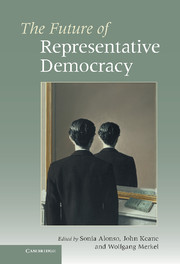Book contents
- Frontmatter
- Contents
- List of figures
- List of tables
- Notes on contributors
- Acknowledgements
- Editors' introduction: Rethinking the future of representative democracy
- 1 Representative democracy and its critics
- 2 Representative democracy and the populist temptation
- 3 The wider canvas: representation and democracy in state and society
- 4 Performance and deficits of present-day representation
- 5 Do parliaments have a future?
- 6 Engendering representative democracy
- 7 Representative democracy and the multinational demos
- 8 Diagnosing and designing democracy in Europe
- 9 Monitory democracy?
- 10 Representing nature
- 11 Democracy and representation beyond the nation state
- General bibliography
- Index
- References
1 - Representative democracy and its critics
Published online by Cambridge University Press: 05 June 2012
- Frontmatter
- Contents
- List of figures
- List of tables
- Notes on contributors
- Acknowledgements
- Editors' introduction: Rethinking the future of representative democracy
- 1 Representative democracy and its critics
- 2 Representative democracy and the populist temptation
- 3 The wider canvas: representation and democracy in state and society
- 4 Performance and deficits of present-day representation
- 5 Do parliaments have a future?
- 6 Engendering representative democracy
- 7 Representative democracy and the multinational demos
- 8 Diagnosing and designing democracy in Europe
- 9 Monitory democracy?
- 10 Representing nature
- 11 Democracy and representation beyond the nation state
- General bibliography
- Index
- References
Summary
The democracy of the moderns
The term ‘representative democracy’ conveys the complexity, richness and uniqueness of the political order of the moderns, an original synthesis of two distinct and in certain respects alternative political traditions. ‘Democracy’, a Greek word with no Latin equivalent, stands for direct rule (‘getting things done’) by the people. Representation, a Latin word with no Greek equivalent, entails a delegated action on the part of some on behalf of someone else. As a mixture of these two components, in its standard meaning representative democracy has four main features: (a) the sovereignty of the people expressed in the electoral appointment of the representatives; (b) representation as a free mandate relation; (c) electoral mechanisms to ensure some measure of responsiveness to the people by representatives who speak and act in their name; and (d) the universal franchise, which grounds representation on an important element of political equality. The central element of this standard account is that constituencies are formally defined by territory, not economic or corporate interests or cultural identities, an aspect that has belonged to democracy since Cleisthenes' reform of demes in Athens during the sixth century BCE: ‘in almost every democracy in the world, citizens are represented by where they live’ (Rehfeld 2005: 3). This basic formal equality in the distribution of voting power among adult citizens gives the mark of authorisation and legitimacy to a government that relies upon consent, yet not on the direct presence by the people in the lawmaking process.
- Type
- Chapter
- Information
- The Future of Representative Democracy , pp. 23 - 49Publisher: Cambridge University PressPrint publication year: 2011
References
- 31
- Cited by



